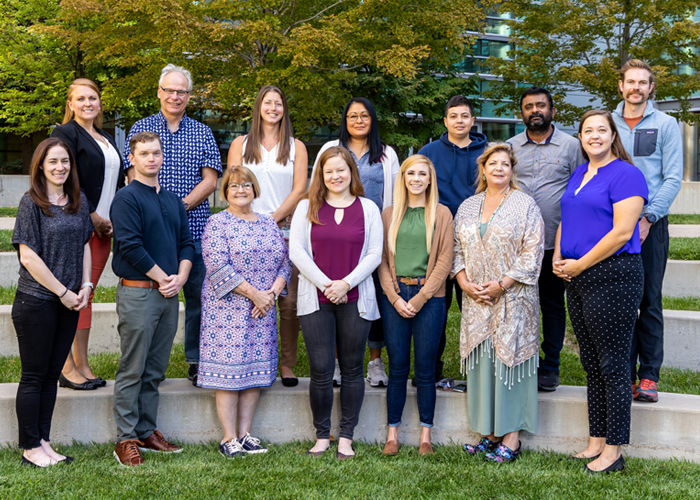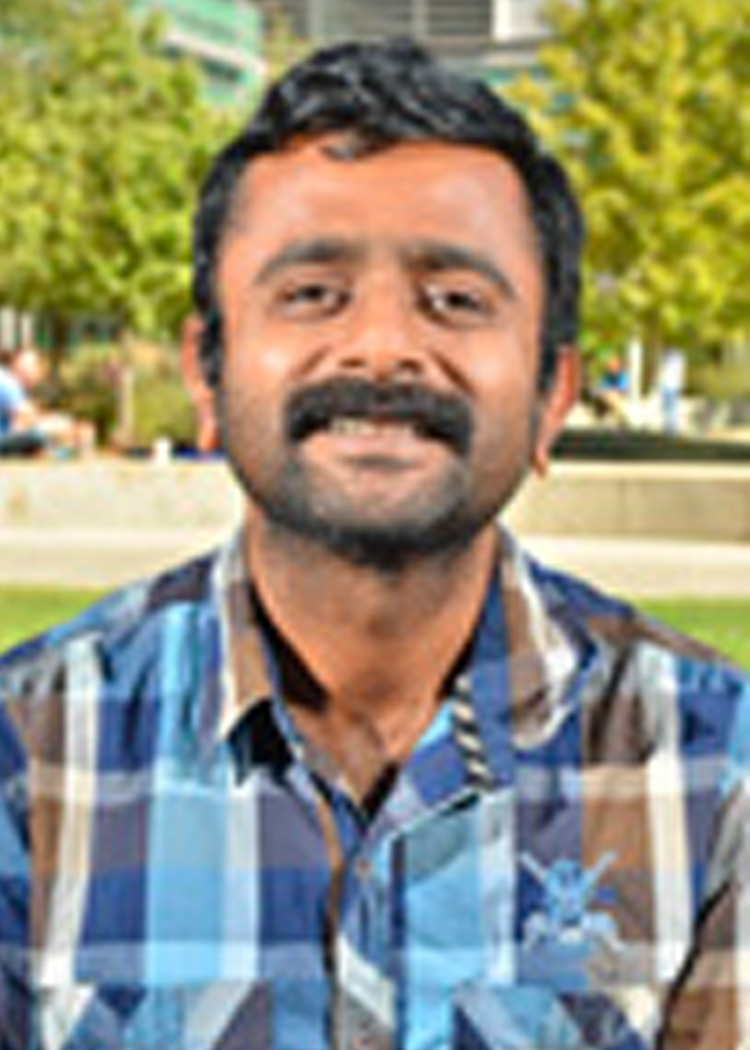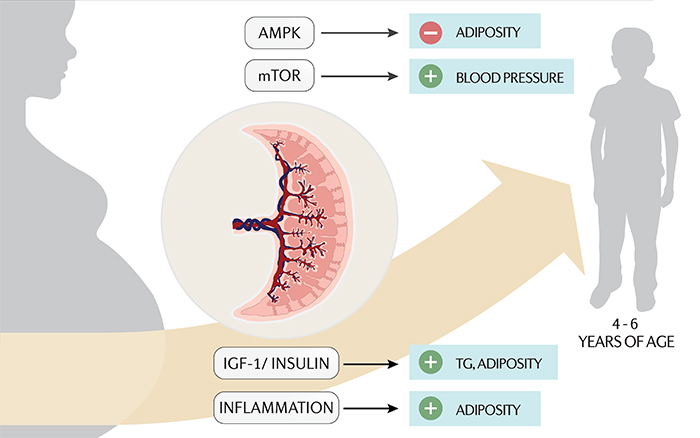Trophoblast-specific gene targeting in Mice: The critical role of placental amino acid transporters for fetal growth and development
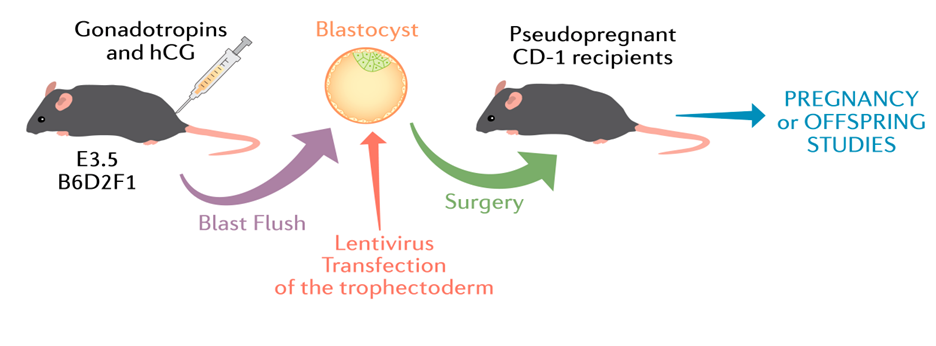
Based on the original publication from Ikawa’s lab (Okada et al., Nat Biotechnol 2007 (2):233-7) we have optimized a procedure for specific trophoblast gene manipulation by transfecting only the trophectoderm of embryonic day 3.5 (E3.5) blastocysts. Following transfection, the embryos are transferred to recipient dams and both fetal and offspring studies are conducted to examine the short and long-term impact of either knockdown or over-expression of signaling molecules, hormone receptors or nutrient transporters. Using this model, we have demonstrated that the expression and activity of placental amino acid are strongly linked to fetal growth. Trophoblast-specific knockdown of SNAT2, an isoform of the System A amino acid transporter, caused fetal growth restriction while trophoblast-specific overexpression of LAT1, an isoform of the System L amino acid transporter, resulted fetal overgrowth. Additionally, overexpression of adiponectin receptor isoform 2 in the trophoblast resulted in fetal growth restriction. Using a different approach to achieve trophoblast-specific gene targeting (involving transgenesis using Piggy-Bac transposons) in mice, we demonstrated that mechanistic target of rapamycin (mTOR) regulates placental SNAT2 and LAT1 in vivo and trophoblast-specific knockdown of mTOR causes fetal growth restriction.
List of relevant papers:
Rosario FJ, Urschitz J, Razavy H, Elston M, Theresa PL, Jansson T. 2025 PiggyBac Transposase Mediated Inducible Trophoblast-specific Knockdown of Mtor Decreases Placental Nutrient Transport and Fetal Growth Clin Sci (Lond):CS20243293.
Rosario FJ, Barentsen K, Powell TL, Urschitz J, Brown TL, Kanai Y, Jansson T. 2024. Trophoblast-specific overexpression of the LAT1 increases transplacental transport of essential amino acids and fetal growth in mice. PNAS Nexus. Jun 18;3(6):207.
Dumolt JH, Rosario FJ, Barentsen K, Urschitz J, Powell TL, and Jansson T. 2024. "Trophoblast‐specific overexpression of adiponectin receptor 2 causes fetal growth restriction in pregnant mice." The FASEB Journal 38, no. 19 (2024): e70100.
Vaughan OR, Rosario FJ, Chan J, Cox LA, Ferchaud-Roucher V, Zemski-Berry KA, Reusch JEB, Keller AC, Powell TL, Jansson T. 2022 Maternal obesity causes fetal cardiac hypertrophy and alters adult offspring myocardial metabolism in mice J Physiol. 600(13):3169-3191.
MFSD2a as a placental transporter critical for mediating transfer of DHA from the mother to the fetus
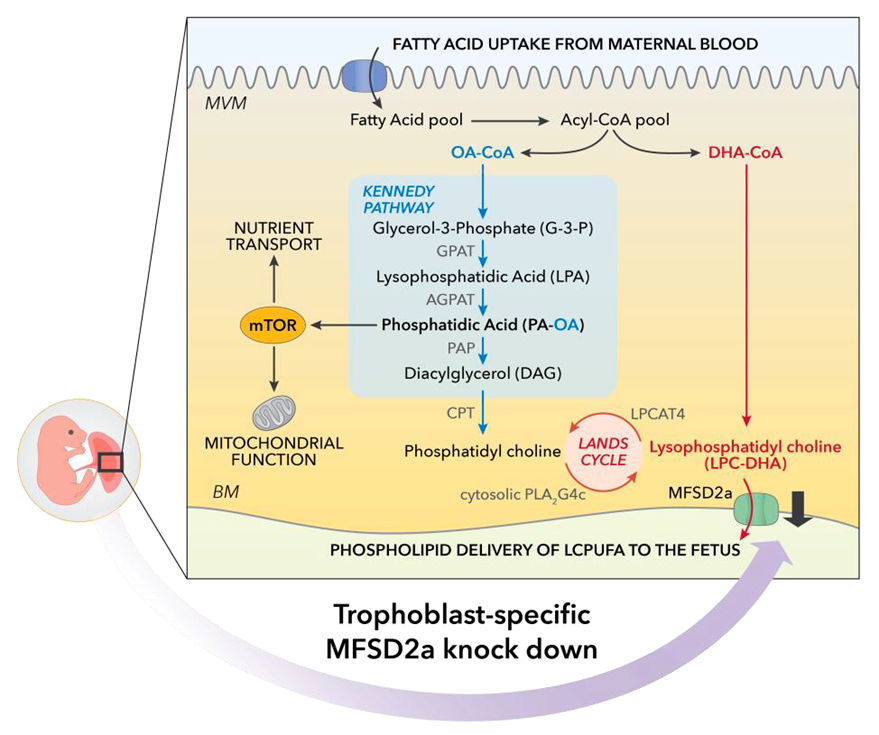
Our lab has reported that a specific transporter for the omega-3 long chain polyunsaturated fatty acid docosahexaenoic acid (DHA) is localized in the basal plasma membrane (BM) of the syncytiotrophoblast, the transporting and hormone-producing epithelium of the human placenta. This transporter, called MFSD2a, specifically transports DHA in the form of a lysophospholipid, such as lyso-PC. When we specifically reduced expression of MFSD2a in the mouse placenta, keeping maternal and fetal expression normal, the fetuses exhibited microcephaly with reduced phospholipid DHA content in the brain. This work has identified MFSD2a as a placental transporter critical for mediating transfer of DHA from the mother to the fetus. We are currently investigating the long-term implications of reduced placental DHA transfer on brain function, anxiety and learning in offspring.
List of relevant papers:
Powell T L, Uhlson C, Madi L, Zemski-Berry K, Chassen SC, Jansson T, Ferchaud-Roucher V. 2023. Fetal sex differences in placental LCPUFA ether and plasmalogen phosphatidylethanolamine and phosphatidylcholine contents in pregnancies complicated by obesity. Biology of Sex Differences 14:66.
Powell TL., Barentsen K, Vaughan OR, Uhlson C, Zemski-Berry K, Erickson K, Faer K, Chassen SC, Jansson T. 2023. Knockdown of Placental Major Facilitator Superfamily Domain Containing 2a in Pregnant Mice Reduces Fetal Brain Growth and Phospholipid Docosahexaenoic Acid Content. Nutrients 15: 4956.
Human Placental Proteins as a Novel Intervention to Improve Outcomes in Prematurity
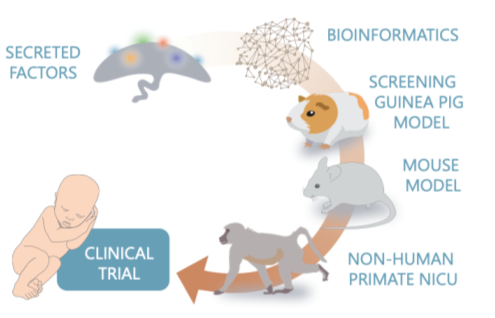
Prematurity (being born before week 37 of pregnancy) and its complications are the number one cause of death of babies in the United States and one million infants die every year in the world from complications due to prematurity. Currently, we have no effective treatment to prevent babies to be born prematurely. Despite improvement in care of the premature infant, babies who survive premature birth often have long-term health problems, including cerebral palsy, fatty liver disease, intellectual disabilities, chronic lung disease, blindness and hearing loss. Thus, prematurity is a problem of profound public health impact that requires a different way of thinking and the development of new treatments.
Emerging evidence in animal studies shows that factors secreted by the placenta are critical for normal fetal organ development. One of the most fundamental differences between fetal and postnatal life is the instantaneous discontinuation of the umbilical circulation at delivery, depriving the premature infant of placental factors, such as proteins, critical for fetal organ development. We reported that 434 proteins are secreted by the placenta into the fetal circulation before 32 weeks of gestation. Remarkably, a substantial number of these proteins could be linked to processes such as angiogenesis, pulmonary development and neurogenesis, suggesting that a subset of these proteins is critical for the normal development of fetal organs that are often injured in premature infants.
In this project we will test the idea that the premature baby is deprived of placental proteins that are critical for the development of their organs, including the lung, brain and the liver, and administration of some of these proteins to premature pups in an animal model improves outcomes. Our preliminary studies support this idea in that supplementation with five selected placental proteins prevented that premature guinea-pigs died: one third of premature pups died in the control group whereas no premature pup died in the group receiving placental proteins. It is possible that this will lead to a novel intervention that could be introduced in the future in the human neonatal intensive care unit, potentially saving lives and decreasing the risk of long-term handicaps in premature babies.
Relevant paper:
Schreiner C, Powell TL, Palmer C, Jansson T. 2022 Placental proteins with predicted roles in fetal development decrease in premature infants. Pediatr Res. 92:1316-1324.
Placental insufficiency is more than decreased blood flow.
A lack of normal increase of maternal placental blood flow (sometimes referred to as “placental insufficiency”) constitutes the most common cause of intrauterine growth restriction in Western societies. We demonstrated that IUGR is associated with down-regulation of specific placental nutrient transporters in humans and animal models. This finding directly supported the emerging concept that placental responses to reduced placental blood flow are highly complex and, in fact, contribute directly to reduced fetal growth.
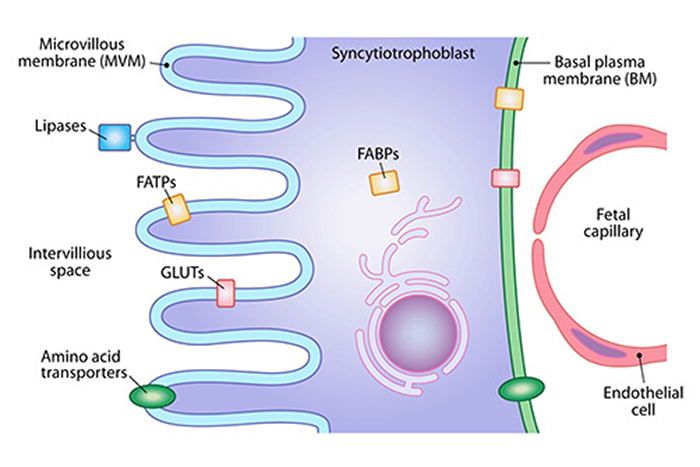
Discovery of novel regulators of amino acid transporters.
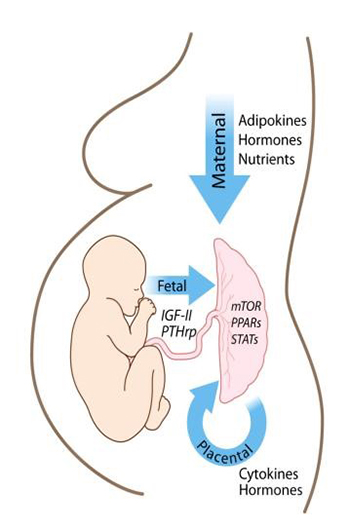
Following our demonstration that IUGR and fetal overgrowth are associated with specific changes in placental nutrient transport activity, we performed a number of studies in animal models and primary human cultured trophoblast to identify factors regulating key placental nutrient transporters. This work led to the discoveries that placental amino acid transporters are regulated by leptin, adiponectin and mTOR signaling. Using siRNA to target specific genes in primary human trophoblast cells, we demonstrated that post translational mechanisms under the influence of mTOR Complex 1 and 2 regulate trophoblast amino acid transporters.
Placental nutrient sensing model.
We have developed a novel model for regulation of placental function highlighting maternal signals that impinge upon the syncytiotrophoblast, the placental epithelium, due to the intimate contact with maternal blood. Formerly the placenta was thought to be regulated predominantly by the fetus and that the fetus acts as a parasite. We propose that the placenta integrates a multitude of maternal and fetal nutritional cues through intrinsic nutrient sensing signaling pathways to match fetal growth rates with the maternal ability to supply nutrients. This complex integration of maternal physiology, placental growth and nutrient transport we have called placental nutrient sensing. This ensures optimal allocation of resources between the mother and the fetus to maximize the propagation of parental genes without jeopardizing maternal health. Thus, placental nutrient sensing modulates maternal-fetal resource allocation to increase the likelihood of reproductive success.
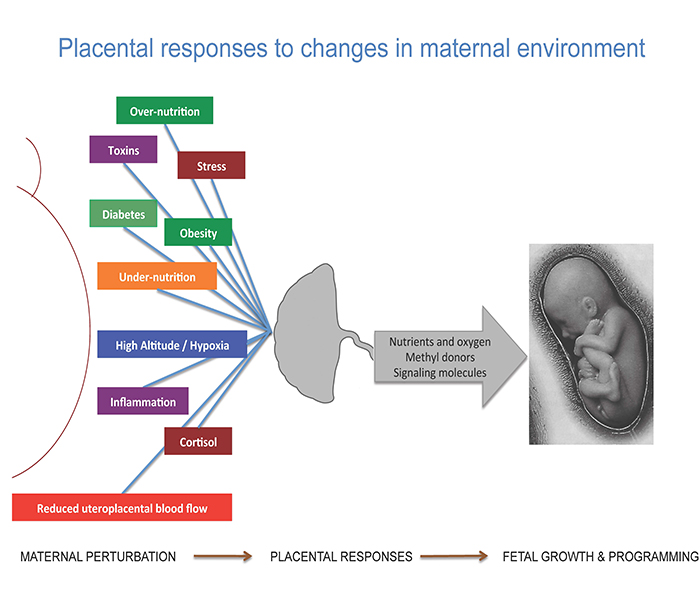
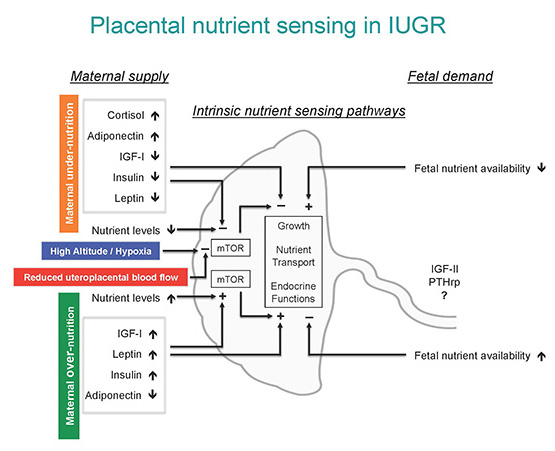
mTOR as a novel folate sensor.
We recently discovered that mTOR functions as a folate sensor. Folate deficiency in pregnant mice causes inhibition of mTOR Complex 1 and 2 in maternal tissues and in the placenta, decreased expression and activity of key amino acid transporters in the placental barrier and fetal growth restriction. Folate sensing by mTOR was demonstrated in cultured trophoblast cells and in human cell lines (HEK293 and MCF7). Thus, we identified a novel molecular link between folate availability and cell function and propose that mTOR folate sensing in trophoblast cells matches placental nutrient transport and fetal growth to maternal folate status. In proliferating cells, including cancer cells, mTOR may modulate cell growth and proliferation in response to changes in folate availability.
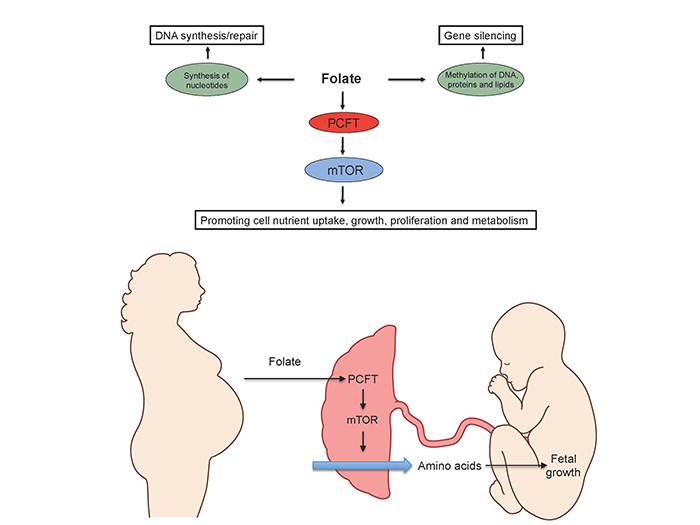
A novel mouse model of obesity in pregnancy.
We have recently developed a novel mouse model of maternal obesity, which has important similarities with obesity in pregnant women, including up-regulation of placental transport functions and fetal overgrowth. We believe that this model will provide us with new tools to identify the mechanisms linking maternal obesity to poor fetal short and long-term outcomes.
DHA supplementation to improve placental function.
We are investigating potential strategies for therapeutic modulation of placental function in pregnancy that could allow for new treatment modalities. We are working toward safe, well-tolerated and effective strategies such as improved omega 3 fatty acid status to modulate placental delivery of nutrients to the fetus and improve growth and optimize body composition. These efforts are inspired by the need to break the vicious cycle between poor intra-uterine growth and life-long health risk.
Adiponectin as a novel endocrine link between maternal adipose tissue and placental function.
Almost 2/3 of American women today enter pregnancy either overweight or obese and although many of these women have normal pregnancies there is an increased risk to have pregnancy complications such as fetal overgrowth. These children have a higher risk to develop obesity and diabetes. Adiponectin is a hormone that it is produced in adipose tissue and circulating levels of adiponectin are high in lean and low in obese individuals. We have discovered that adiponectin regulates placental function and in contrast to other tissues, adiponectin causes insulin resistance in the placenta. In lean women with high adiponectin this results in a “physiological brake” to prevent excess nutrient transfer to the baby. In obese pregnant women with low adiponectin too much nutrient is transferred to the baby, stimulating growth and fat deposition. We have recently reported that adiponectin supplementation prevents the excess placental delivery of nutrients to the fetus in obese mice and the fetus grows normally and has normal levels of sugar in the blood.
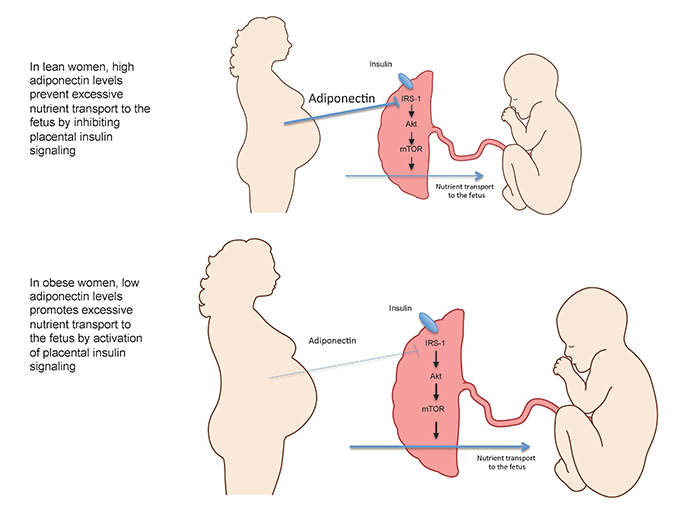
Placental origins of disease: Associations between placental function and cardio-metabolic outcomes at 4-6 years of age.
In collaboration with Dana Dabelea in the LEAD CENTER we have studied placental samples from 109 healthy women delivering at term in the Healthy START cohort. This has allowed us to report some interesting associations between placental function (in the form of activity of key signaling pathways) and cardiometabolic outcomes in 4–6-year-old children. Specifically, we have shown that the activity of placenta AMPK signaling – a cellular energy sensor – is negatively associated with adiposity in children whereas the activity on placental mTOR signaling – a cellular nutrient sensor – is positively correlated to blood pressure at 4-6 years of age Moreover, placental IGF-1/insulin signaling is positively associated with TG and adiposity at 4-6 years of age, and placental inflammation is positively correlated with adiposity in children.
